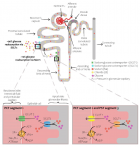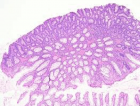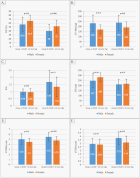Abstract
Research Article
Prevalence and seasonal variations of eggs of gastrointestinal nematode parasites of goats from smallholder farms in Mozambique
Alsácia Atanásio-Nhacumbe* and Carlos Francisco Sitoe
Published: 23 July, 2019 | Volume 3 - Issue 1 | Pages: 023-029
A survey was carried out to determine the prevalence and seasonal variations of eggs of gastrointestinal nematodes in goats in four provinces of Mozambique, from November 2016 to October 2017 in Tete and Cabo Delgado, and from November 2016 to October 2018 in Maputo and Gaza. In each province, flocks were selected from both lowlands, located within the valleys of the rivers, and uplands which are located outside the valleys. Faecal samples were collected at monthly intervals to monitor faecal egg counts fluctuations. The modified McMaster technique was used for quantitative analysis of nematode eggs and for detecting cestode eggs in faecal samples. The sedimentation technique for detecting trematode eggs in faecal samples was used. A total of 2 703 samples were examined for nematode eggs and 2 587 for trematode eggs. Faecal examination indicated that between 18% and 100% of goats sampled were infected with gastro-intestinal nematodes. The prevalence varied according to the season of the year and the ecological conditions. The highest prevalence and worm egg counts were recorded at about the peak of the rainy season. Strongyloides papillosus, Calicophoron spp., Fasciola spp. and Schistosoma mattheei eggs were also found. Moniezia expansa and Moniezia benedeni eggs were found in all the four study areas but its prevalence was low and irregular. Based on the results of this study, which showed a clear seasonal pattern, strategic anthelmintic medications to effectively control helminth infections in goats in the different ecological zones of Mozambique are suggested.
Read Full Article HTML DOI: 10.29328/journal.ivs.1001016 Cite this Article Read Full Article PDF
Keywords:
Prevalence; Seasonal variations; Gastrointestinal nematodes; Goats; Smallholder farms
References
- Fraser A, Craig PS. Detection of gastrointestinal helminth infections using coproantigen and molecular diagnostic approaches. J Helminthol. 1997; 71: 103-107. PubMed: https://www.ncbi.nlm.nih.gov/pubmed/9192710
- Carmichael IH. Internal and external parasites as constraints to productivity of small ruminants in the humid tropics. In: (Eds.) Manika Wodzicka-Tomaskewska, Susan Gardiner, A. Djajanegara, I.M. Mastika & T.M. Wiradarya. Sebelas Maret. Small ruminant production in the humid tropics. University Press. 1993; 285-335.
- Owhoeli O, Elele K, Gboeloh LB. Prevalence of gastrointestinal helminths in exotic and indigenous goats slaughtered in selected abattoirs in Port Harcourt, South-South, Nigeria. Chinese Journal of Biology. 2014; 2014: 435913.
- Thamsborg SM, Roepstorff A, Larsen P. Integrated and biological control of parasites in organic and conventional production systems. Vet Parasitol. 1999; 84: 169-186. PubMed: https://www.ncbi.nlm.nih.gov/pubmed/10456414
- Zvinorova PI, Halimani TE, Muchadeyi FC, Matika O, Riggio V, et al. Prevalence and risk factors of gastrointestinal parasitic infections in goats in low-input low-output farming systems in Zimbabwe. Small Rumin Res. 2016; 143: 75-83. PubMed: https://www.ncbi.nlm.nih.gov/pubmed/27766016
- FAO expert consultation on helminth infections of livestock in developing countries. Rome, Italy, 23-27 September 1991. Food and Agriculture Organization of the United Nations.
- Reinecke RK. Helminth research in South Africa. III. The diagnosis of nematode parasites in ruminants for worm survey purposes. J South African Veterinary Medical Association. 1961; 37: 27-31.
- Reinecke RK. Veterinary helminthology. Durban: Butterworths. 1983.
- Dunn AM. Veterinary helminthology. William Heinemann Medical Books. London. Second Edition. 1978; 295-298.
- Hansen J, Perry B. The epidemiology, diagnosis and control of helminth parasites of ruminants. Second Edition. ILRAD, Nairobi, Kenya. 1994.
- Specht EJ. Seasonal incidence of helminths in sheep and goats in south Mozambique. Vet Parasitol. 1982; 11: 317-328. PubMed: https://www.ncbi.nlm.nih.gov/pubmed/6892176
- Costa RF. Patterns of disease in small family goat farms in Mozambique. MSc thesis, Faculty of Veterinary Medicine, Swedish University of Agricultural Sciences. 1993.
- Khan MQ, Ghaffar A, Anwar M, Khan MA. Importance of parasites as a constraint on small ruminant production in Pakistan. Report of an international workshop on Sustainable parasite control in small ruminants, held in Bogor, Indonesia. 1997; 22-25.
- Van Aken D, De Bont J, Vercruysse J, Dorny P. Gastro-intestinal nematode infections in a goat breeding farm in North-Western Sri Lanka. Trop Anim Health Prod. 1990; 22: 231-238. PubMed: https://www.ncbi.nlm.nih.gov/pubmed/2288007
- Waller PJ. Nematode parasite control of livestock in the tropics/subtropics: the need for novel approaches. Int J Parasitol. 1997; 27: 1193-1201. PubMed: https://www.ncbi.nlm.nih.gov/pubmed/9394190
- Nwosu CO, Ogunrinade AF, Fagbemi BO. Prevalence and seasonal changes in the gastro-intestinal helminths of Nigerian goats. J Helminthol. 1996; 70: 329-333. PubMed: https://www.ncbi.nlm.nih.gov/pubmed/8960229
- Vercruysse J. A survey of seasonal changes in nematode faecal egg count levels of sheep and goats in Senegal. Vet Parasitol. 1983; 13: 239-244. PubMed: https://www.ncbi.nlm.nih.gov/pubmed/6686379
- Asanji MF. Haemonchosis in sheep and goats in Sierra Leone. J Helminthol. 1988; 62: 243-249. PubMed: https://www.ncbi.nlm.nih.gov/pubmed/3192917
- Suarez VH, Busetti MR. The epidemiology of helminth infections of growing sheep in Argentina’s Western Pampas. Int J Parasitol. 1995; 25: 489-494. PubMed: https://www.ncbi.nlm.nih.gov/pubmed/7635625
- Macpherson CN. Epidemiology and control of parasites in nomadic situations. Vet Parasitol. 1994; 54: 87-102. PubMed: https://www.ncbi.nlm.nih.gov/pubmed/7846874
- Nwosu CO, Madu PP, Richards WS. Prevalence and seasonal changes in the population of gastrointestinal nematodes of small ruminants in the semi-arid zone of north-eastern Nigeria. Vet Parasitol. 2007; 144: 118-124. PubMed: https://www.ncbi.nlm.nih.gov/pubmed/17127006
- Connor RJ, Munyuku AP, Mackayo E, Halliwell RW. Helminthosis in goats in southern Tanzania: Investigations on epidemiology and control. Trop Anim Health Prod. 1990; 22: 1-6. PubMed: https://www.ncbi.nlm.nih.gov/pubmed/2321258
- Shija DSN, Kusiluka LJM, Chenyambuga SW, Shayo D, et al. Animal health constraints in dairy goats kept under smallholder farming systems in Kongwa and Mvomero Districts, Tanzania. J Vet Med Anim Health. 2014; 6: 268-279.
- Goossens B, Osaer S, Kora S, Chandler KJ, Petrie L, et al. Abattoir survey of sheep and goats in The Gambia. Vet Rec. 1998; 143: 277-281. PubMed: https://www.ncbi.nlm.nih.gov/pubmed/9569483
- Fivaz BH, Horak IG, Williams EJ. Helminth and arthropod parasites of Angora goats on irrigated kikuyu grass pastures in the Eastern Cape Province. J S Afr Vet Assoc. 1990; 61: 112-116. PubMed: https://www.ncbi.nlm.nih.gov/pubmed/2286996
- Rossanigo CE, Gruner L. Moisture and temperature requirements in faeces for the development of free-living stages of gastrointestinal nematodes of sheep, cattle and deer. J Helminthol. 1995; 69: 357-362. PubMed: https://www.ncbi.nlm.nih.gov/pubmed/8583130
- Horchner F. Proposals for epidemiological surveys of helminthosis aimed at the improvement of livestock production in the tropics. Trop Med Parasitol. 1990; 41: 422-424. PubMed: https://www.ncbi.nlm.nih.gov/pubmed/2075388
- Thrusfield M. Veterinary epidemiology. Butterworths. Determinants of disease. 1986; 47-75.
- Agyei AD. Epidemiological observations on helminth infections of calves in southern Ghana. Trop Anim Health Prod. 1991; 23: 134-140. PubMed: https://www.ncbi.nlm.nih.gov/pubmed/1763433
- Urquhart GM, Armour J, Duncan JL, Dunn AM, Jennings FW. Veterinary parasitology. Longman Scientific & Technical. 1987.
- Atanásio A. Helminths, Protozoa, Heartwater, and the Effect of Gastro-intestinal Nematodes on the Productivity of Goats of the Family Sector in Mozambique. PhD thesis in Veterinary Science. Medical University of Southern Africa (MEDUNSA). 2000.
- Cruz e Silva JA. A contribution to the study of animal helminthiasis in southern of Save. Veterinária Moçambicana. 1971; 4: 33-42.
Figures:

Figure 1

Figure 2

Figure 3

Figure 4

Figure 5

Figure 6

Figure 7

Figure 8

Figure 9

Figure 10

Figure 11

Figure 12

Figure 13

Figure 14

Figure 15

Figure 16
Similar Articles
-
Investigation on Theileria lestoquardi infection among sheep and goats in Nyala, South Darfur State, SudanOsman TM,Ali AM*,Hussein MO,El Ghali A,Salih DA. Investigation on Theileria lestoquardi infection among sheep and goats in Nyala, South Darfur State, Sudan. . 2017 doi: 10.29328/journal.ivs.1001002; 1: 017-023
-
Use of the Reverse Transcription-Polymerase Chain Reaction for differential detection of two lineages of the canine distemper virus in ChileBolívar P,Céspedes PF,Navarro C*. Use of the Reverse Transcription-Polymerase Chain Reaction for differential detection of two lineages of the canine distemper virus in Chile. . 2019 doi: 10.29328/journal.ivs.1001014; 3: 005-013
-
Prevalence and seasonal variations of eggs of gastrointestinal nematode parasites of goats from smallholder farms in MozambiqueAlsácia Atanásio-Nhacumbe*,Carlos Francisco Sitoe. Prevalence and seasonal variations of eggs of gastrointestinal nematode parasites of goats from smallholder farms in Mozambique. . 2019 doi: 10.29328/journal.ivs.1001016; 3: 023-029
-
Identification, Molecular Confirmation, and Antibiotic Sensitivity of Bacteria Isolated from Repeat Breeder Cows in Rangpur DivisionMst. Mousumi Afroj,Md Faruk Islam,Muhammad Mamunur Roshid,Md Shanto Hossain,Md Samiul Tousif,Omiaya Azam Oishi,Subroto Sarma,Begum Fatema Zohara*. Identification, Molecular Confirmation, and Antibiotic Sensitivity of Bacteria Isolated from Repeat Breeder Cows in Rangpur Division. . 2025 doi: 10.29328/journal.ivs.1001047; 9: 008-17
Recently Viewed
-
Endocrine abnormalities in two siblings with Rothmund Thomson SyndromeNagehan Aslan*,Ozgur Pirgon. Endocrine abnormalities in two siblings with Rothmund Thomson Syndrome. Ann Clin Endocrinol Metabol. 2018: doi: 10.29328/journal.acem.1001010; 2: 041-045
-
Obstructive Pyelonephritis Due to Postoperative Ureteral Stricture: A Case ReportAyoub Mamad*,Mohammed Amine Elafari,Mohammed Amine Bibat,Midaoui Moncef,Amine Slaoui,Tarik Karmouni,Abdelatif Koutani,Khalid Elkhader. Obstructive Pyelonephritis Due to Postoperative Ureteral Stricture: A Case Report. J Clin Med Exp Images. 2026: doi: 10.29328/journal.jcmei.1001039; 10: 003-005
-
Examining the Effects of High Poverty and Unemployment on Rural Urban Migration in Nigeria and its Consequences on Urban Resources and Rural DeclineTochukwu S Ezeudu*, Bilyaminu Tukur. Examining the Effects of High Poverty and Unemployment on Rural Urban Migration in Nigeria and its Consequences on Urban Resources and Rural Decline. J Child Adult Vaccines Immunol. 2024: doi: 10.29328/journal.jcavi.1001012; 8: 001-013
-
Case Report of a Child with Beta Thalassemia Major in a Tribal Region of IndiaNeha Chauhan, Prakash Narayan, Mahesh Narayan, Manisha Shukla*. Case Report of a Child with Beta Thalassemia Major in a Tribal Region of India. J Child Adult Vaccines Immunol. 2023: doi: 10.29328/journal.jcavi.1001011; 7: 005-007
-
Analysis and Control of a Glucose-insulin Dynamic ModelLakshmi N Sridhar*. Analysis and Control of a Glucose-insulin Dynamic Model. Ann Clin Endocrinol Metabol. 2026: doi: 10.29328/journal.acem.1001033; 10: 010-016
Most Viewed
-
Effects of dietary supplementation on progression to type 2 diabetes in subjects with prediabetes: a single center randomized double-blind placebo-controlled trialSathit Niramitmahapanya*,Preeyapat Chattieng,Tiersidh Nasomphan,Korbtham Sathirakul. Effects of dietary supplementation on progression to type 2 diabetes in subjects with prediabetes: a single center randomized double-blind placebo-controlled trial. Ann Clin Endocrinol Metabol. 2023 doi: 10.29328/journal.acem.1001026; 7: 00-007
-
Physical Performance in the Overweight/Obesity Children Evaluation and RehabilitationCristina Popescu, Mircea-Sebastian Șerbănescu, Gigi Calin*, Magdalena Rodica Trăistaru. Physical Performance in the Overweight/Obesity Children Evaluation and Rehabilitation. Ann Clin Endocrinol Metabol. 2024 doi: 10.29328/journal.acem.1001030; 8: 004-012
-
Hypercalcaemic Crisis Associated with Hyperthyroidism: A Rare and Challenging PresentationKarthik Baburaj*, Priya Thottiyil Nair, Abeed Hussain, Vimal MV. Hypercalcaemic Crisis Associated with Hyperthyroidism: A Rare and Challenging Presentation. Ann Clin Endocrinol Metabol. 2024 doi: 10.29328/journal.acem.1001029; 8: 001-003
-
Exceptional cancer responders: A zone-to-goDaniel Gandia,Cecilia Suárez*. Exceptional cancer responders: A zone-to-go. Arch Cancer Sci Ther. 2023 doi: 10.29328/journal.acst.1001033; 7: 001-002
-
The benefits of biochemical bone markersSek Aksaranugraha*. The benefits of biochemical bone markers. Int J Bone Marrow Res. 2020 doi: 10.29328/journal.ijbmr.1001013; 3: 027-031

If you are already a member of our network and need to keep track of any developments regarding a question you have already submitted, click "take me to my Query."

















































































































































